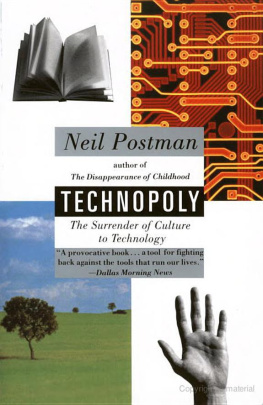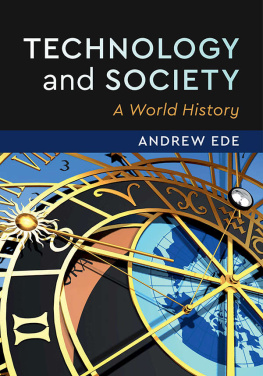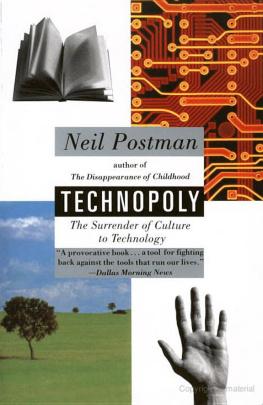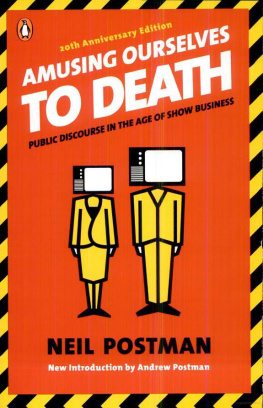Neil Postman - Technopoly: The Surrender of Culture to Technology
Here you can read online Neil Postman - Technopoly: The Surrender of Culture to Technology full text of the book (entire story) in english for free. Download pdf and epub, get meaning, cover and reviews about this ebook. year: 1993, publisher: Vintage, genre: History. Description of the work, (preface) as well as reviews are available. Best literature library LitArk.com created for fans of good reading and offers a wide selection of genres:
Romance novel
Science fiction
Adventure
Detective
Science
History
Home and family
Prose
Art
Politics
Computer
Non-fiction
Religion
Business
Children
Humor
Choose a favorite category and find really read worthwhile books. Enjoy immersion in the world of imagination, feel the emotions of the characters or learn something new for yourself, make an fascinating discovery.
- Book:Technopoly: The Surrender of Culture to Technology
- Author:
- Publisher:Vintage
- Genre:
- Year:1993
- Rating:4 / 5
- Favourites:Add to favourites
- Your mark:
- 80
- 1
- 2
- 3
- 4
- 5
Technopoly: The Surrender of Culture to Technology: summary, description and annotation
We offer to read an annotation, description, summary or preface (depends on what the author of the book "Technopoly: The Surrender of Culture to Technology" wrote himself). If you haven't found the necessary information about the book — write in the comments, we will try to find it.
Technopoly: The Surrender of Culture to Technology — read online for free the complete book (whole text) full work
Below is the text of the book, divided by pages. System saving the place of the last page read, allows you to conveniently read the book "Technopoly: The Surrender of Culture to Technology" online for free, without having to search again every time where you left off. Put a bookmark, and you can go to the page where you finished reading at any time.
Font size:
Interval:
Bookmark:
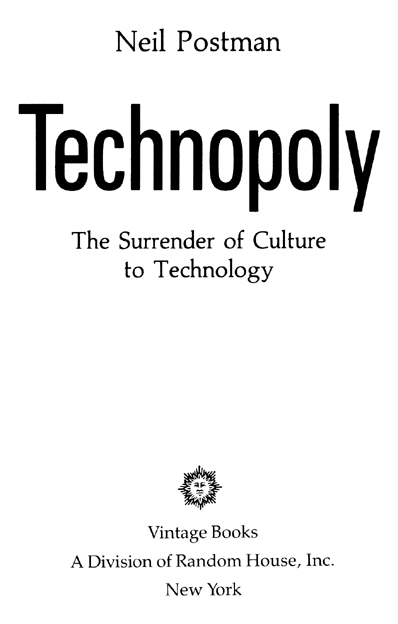
For Faye and Manny
Whether or not it draws on new scientific research, technology is a branch of moral philosophy, not of science.
P AUL G OODMAN , New Reformation
Copyright
In 1959, Sir Charles Snow published The Two Cultures and the Scientific Revolution, which was both the title and the subject of the Rede Lecture he had given earlier at Cambridge University. The lecture was intended to illuminate what Sir Charles saw as a great problem of our agethe opposition of art and science, or, more precisely, the implacable hostility between literary intellectuals (sometimes called humanists) and physical scientists. The publication of the book caused a small rumble among academics (let us say, a 2.3 on the Richter Scale), not least because Snow came down so firmly on the side of the scientists, giving humanists ample reason and openings for sharp, funny, and nasty ripostes. But the controversy did not last long, and the book quickly faded from view. For good reason. Sir Charles had posed the wrong question, given the wrong argument, and therefore offered an irrelevant answer. Humanists and scientists have no quarrel, at least none that is of sufficient interest to most people.
Nonetheless, to Snow must go some considerable credit for noticing that there are two cultures, that they are in fierce opposition to each other, and that it is necessary for a great debate to ensue about the matter. Had he been attending less to the arcane dissatisfactions of those who dwell in faculty clubs and more to the lives of those who have never been in one, he would surely have seen that the argument is not between humanists and scientists but between technology and everybody else. This is not to say that everybody else recognizes this. In fact, most people believe that technology is a staunch friend. There are two reasons for this. First, technology is a friend. It makes life easier, cleaner, and longer. Can anyone ask more of a friend? Second, because of its lengthy, intimate, and inevitable relationship with culture, technology does not invite a close examination of its own consequences. It is the kind of friend that asks for trust and obedience, which most people are inclined to give because its gifts are truly bountiful. But, of course, there is a dark side to this friend. Its gifts are not without a heavy cost. Stated in the most dramatic terms, the accusation can be made that the uncontrolled growth of technology destroys the vital sources of our humanity. It creates a culture without a moral foundation. It undermines certain mental processes and social relations that make human life worth living. Technology, in sum, is both friend and enemy.
This book attempts to describe when, how, and why technology became a particularly dangerous enemy. The case has been argued many times before by authors of great learning and convictionin our own time by Lewis Mumford, Jacques Ellul, Herbert Read, Arnold Gehlen, Ivan Illich, to name a few. The argument was interrupted only briefly by Snows irrelevancies and has continued into our own time with a sense of urgency, made even more compelling by Americas spectacular display of technological pre-eminence in the Iraqi war. I do not say here that the war was unjustified or that the technology was misused, only that the American success may serve as a confirmation of the catastrophic idea that in peace as well as war technology will be our savior.
You will find in Platos Phaedrus a story about Thamus, the king of a great city of Upper Egypt. For people such as ourselves, who are inclined (in Thoreaus phrase) to be tools of our tools, few legends are more instructive than his. The story, as Socrates tells it to his friend Phaedrus, unfolds in the following way: Thamus once entertained the god Theuth, who was the inventor of many things, including number, calculation, geometry, astronomy, and writing. Theuth exhibited his inventions to King Thamus, claiming that they should be made widely known and available to Egyptians. Socrates continues:
Thamus inquired into the use of each of them, and as Theuth went through them expressed approval or disapproval, according as he judged Theuths claims to be well or ill founded. It would take too long to go through all that Thamus is reported to have said for and against each of Theuths inventions. But when it came to writing, Theuth declared, Here is an accomplishment, my lord the King,
I begin my book with this legend because in Thamus response there are several sound principles from which we may begin to learn how to think with wise circumspection about a technological society. In fact, there is even one error in the judgment of Thamus, from which we may also learn something of importance. The error is not in his claim that writing will damage memory and create false wisdom. It is demonstrable that writing has had such an effect. Thamus error is in his believing that writing will be a burden to society and nothing but a burden. For all his wisdom, he fails to imagine what writings benefits might be, which, as we know, have been considerable. We may learn from this that it is a mistake to suppose that any technological innovation has a one-sided effect. Every technology is both a burden and a blessing; not either-or, but this-and-that.
Nothing could be more obvious, of course, especially to those who have given more than two minutes of thought to the matter. Nonetheless, we are currently surrounded by throngs of zealous Theuths, one-eyed prophets who see only what new technologies can do and are incapable of imagining what they will undo. We might call such people Technophiles. They gaze on technology as a lover does on his beloved, seeing it as without blemish and entertaining no apprehension for the future. They are therefore dangerous and are to be approached cautiously. On the other hand, some one-eyed prophets, such as I (or so I am accused), are inclined to speak only of burdens (in the manner of Thamus) and are silent about the opportunities that new technologies make possible. The Technophiles must speak for themselves, and do so all over the place. My defense is that a dissenting voice is sometimes needed to moderate the din made by the enthusiastic multitudes. If one is to err, it is better to err on the side of Thamusian skepticism. But it is an error nonetheless. And I might note that, with the exception of his judgment on writing, Thamus does not repeat this error. You might notice on rereading the legend that he gives arguments for and against each of Theuths inventions. For it is inescapable that every culture must negotiate with technology, whether it does so intelligently or not. A bargain is struck in which technology giveth and technology taketh away. The wise know this well, and are rarely impressed by dramatic technological changes, and never overjoyed. Here, for example, is Freud on the matter, from his doleful Civilization and Its Discontents:
One would like to ask: is there, then, no positive gain in pleasure, no unequivocal increase in my feeling of happiness, if I can, as often as I please, hear the voice of a child of mine who is living hundreds of miles away or if I can learn in the shortest possible time after a friend has reached his destination that he has come through the long and difficult voyage unharmed? Does it mean nothing that medicine has succeeded in enormously reducing infant mortality and the danger of infection for women in childbirth, and, indeed, in considerably lengthening the average life of a civilized man?
Next pageFont size:
Interval:
Bookmark:
Similar books «Technopoly: The Surrender of Culture to Technology»
Look at similar books to Technopoly: The Surrender of Culture to Technology. We have selected literature similar in name and meaning in the hope of providing readers with more options to find new, interesting, not yet read works.
Discussion, reviews of the book Technopoly: The Surrender of Culture to Technology and just readers' own opinions. Leave your comments, write what you think about the work, its meaning or the main characters. Specify what exactly you liked and what you didn't like, and why you think so.

